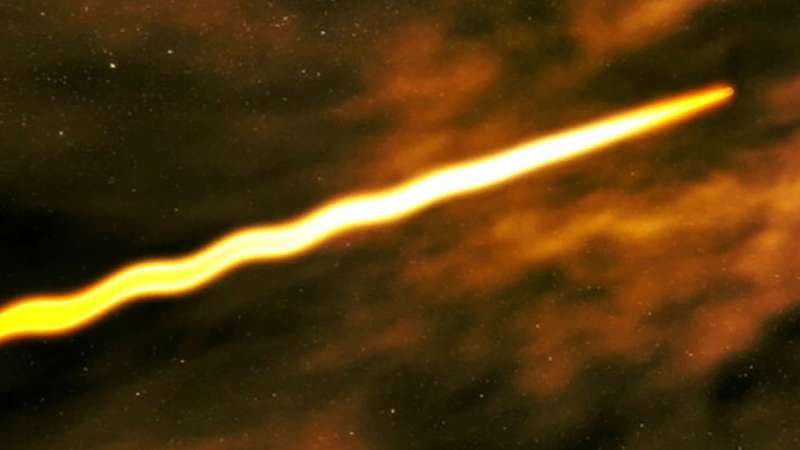
The fastest we humans have ever travelled is 25,000 mph (40,000kph). That was 50 years ago, and no human has yet to travel that fast since. We’ve discussed a great number of ways that technology is advancing ever faster, but moving people through space isn’t one of them. That’s because moving people around very quickly runs into the laws of physics, which are intractable. We can cleverly manipulate these laws using massive amounts of resources, but we can’t override them.
Humans, most likely, will some day go faster than 25,000 miles per hour. Using relatively well understood nuclear power, we believe we could accelerate ourselves to roughly 1/10th the speed of light. Should we eventually overcome the many engineering challenges of creating, storing, and safely using anti-matter, we could even conceivably reach speeds of ½ the speed of light. That’s about as fast as we can go, however, given the laws of physics we currently understand.
In addition to the hundreds if not thousands of years it would take for us to overcome the engineering challenges to reach these speeds, physics presents some other obstacles for us should we ever wish to better explore our universe. One problem is that we can only accelerate so fast without destroying the human body. If you’ve ever accelerated from 0-60mph in 5 seconds, you may have noted that’s about as much excitement as you could comfortably handle. If we were to accelerate to half the speed of light at what would feel like earth’s gravity, it would take us 6 months. Additionally, when travelling at half the speed of light, a few hydrogen atoms in our way could obliterate any material currently known to man.
The problem with the speed of light, however, isn’t that it’s too fast, but rather too slow, particularly when compared with the scale of the universe. If we simultaneously launched 11 spacecraft, all travelling at half the speed of light, it would still take 100 years to reach the 11 known planets in anything like an orbit that could sustain within that range. Were those missions successful, it would take another 50 years until their radio transmissions reached earth to let us know.
These are some pretty ambitious numbers, but not entirely improbable. It’s conceivable that humans could touch another planet outside our solar system where they wouldn’t be instantly vaporized within a thousand years or so if we really wanted to. Discovering life outside of our planet, however, is an entirely other question. When we consider the many variables required for life to have been born on planet earth, and given how utterly barron even the planets in our own solar system are, the preconditions for the spontaneous creation of the resource consuming entities we call life appear to be quite particular and rare.
Although we’re playing with numbers we have limited insight on, given the resources required for space travel, the distances that must be covered, and the statistical rarity of life, even if we generously speculated that one in a million habitable planets might spontaneously produce life, we’re looking at about 250,000 to a million years before we might find extraterrestrial life.
Finally, if we supposed that such life was intelligent and technologically advanced, we might suppose our first contact wouldn’t be in person, but rather through information sent through space. The tragic thing, of course, is that even if we did someday receive a transmission from another world, it would likely have taken so long to reach us, that it would encapsulate what that other society was like, not now, but millions of years ago. Our reply, should we conceive of how to send one, would then reach them an equally long time after it was sent.
The reason I write all of the above is that this is the reality of humans reaching out to another non-human intelligence. The fact is, the most likely scenario for humanity is that we shall fade from existence altogether, whether through the loss of this planet or by transforming intelligent life so radically that it would no longer qualify as human, without ever experiencing another intelligence that isn’t a fellow earthling or one of our creations. Such are the laws of physics, intractable and indifferent to what we may want.
If you’ve managed to read the posts before this one, you may have been at least amused by what has preceded. Afterall, how can one not appreciate the audacity of writing down a new faith in the 21st century. I’m glad if I could at least provide an hour or two of enjoyment, but before we wind down this section of Thanatism and Society, I’d like to leave you with a final thought–Thanatism is real.
Unlike our hopes to one day be rescued by an intelligence not our own, Thantism doesn’t run up against the laws of physics. In fact, there is nothing that prevents Thanatism, as roughly related, to become the reality here on earth. Social structures are undoubtedly intractable, but that intractability dissolves when the people from which those structures emanate, themselves, transform. And the transformation that Thanatism asks of each of us, including you, my dear, amused reader, is absolutely possible and in fact can happen right now.
And does Thanatism ask so much of you? Does it ask you to believe some ancient culture knew the secrets of the universe? Does it ask you to worship something that you cannot see? It doesn’t even require you to go to the gym a few times a week. In fact, what it asks requires no effort at all–just the opposite. Thanatism asks us to simply let go. It just asks us to stop fighting the world we live in and what it has to say about what we are. It just asks us to stop pretending we’re something that we’re not, and to accept each other for what we are.
This is the reality of Thanatism. Should you agree to let go, you will change. Should a few of us let go, we shall be able to commune with each other on a level so real, we have seldom gotten to experience it before. Should enough of us let go, we might even develop a small community where we can explore new ways to live. Should, however, most of us, or possibly even all of us, choose to let go, I can promise you that this world will undergo a transformation no less extraordinary than if ET were to beam down and tell us its perspective on the universe, for that other being wouldn’t be able to share with us anything as transformative as that which we already know.
